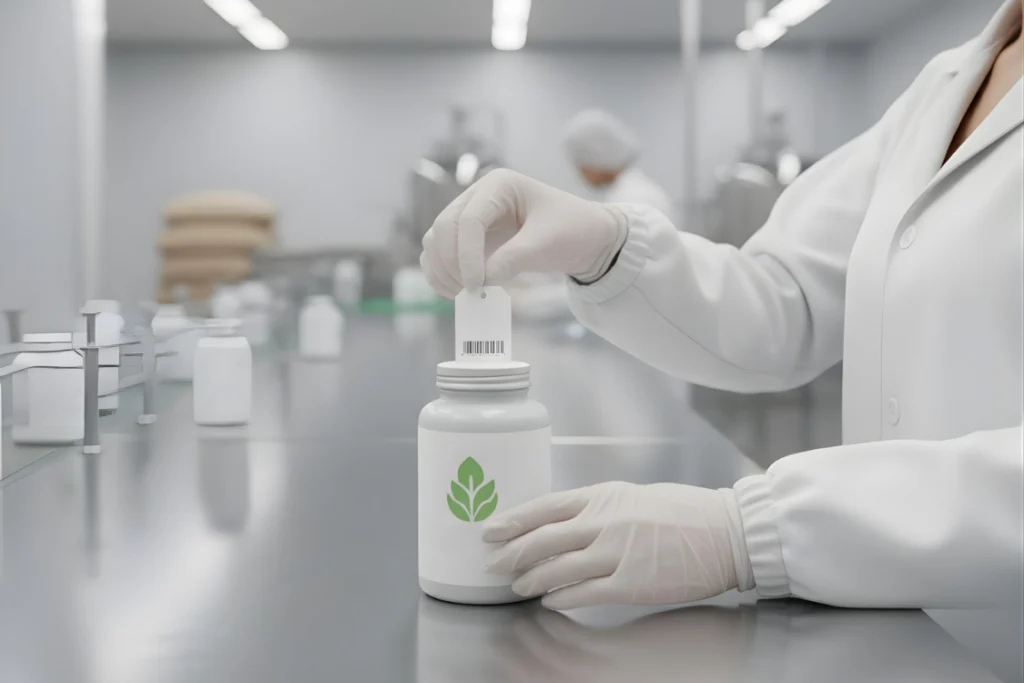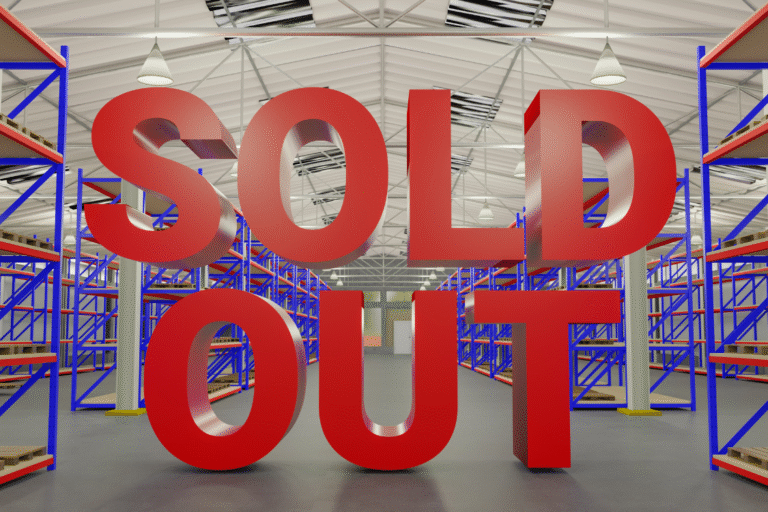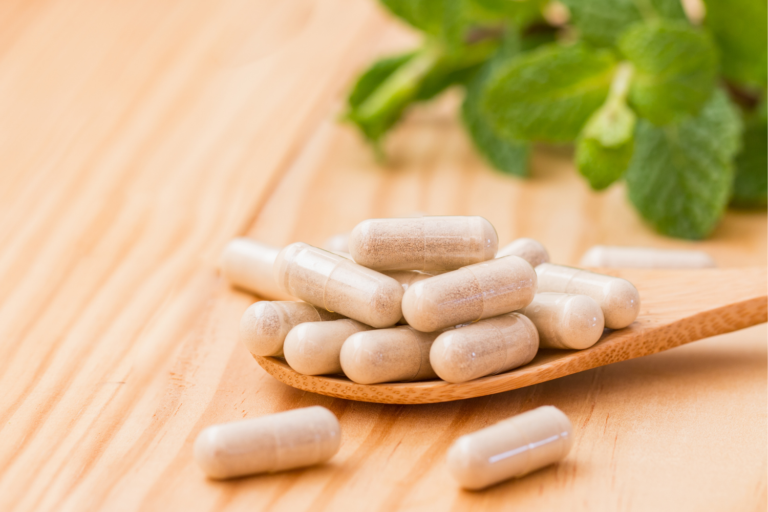Launching a supplement brand works best when supplement manufacturer pricing and MOQ are understood before signing any contract. Unclear terms or high minimum order quantities can strain capital, delay production, and result in unsold inventory.
Most startup budgets range from $10,000 to $100,000, with an average first production run costing $5,000 to $10,000 and about 8–12 weeks from formulation to finished stock. Knowing how MOQ, dosage form, packaging, third-party testing, compliance, and economies of scale affect total cost helps founders plan smarter, maintain healthy cash flow, and stay on schedule.
What Is an MOQ and Why Does It Matter?
A minimum order quantity (MOQ) is the smallest number of units a supplement manufacturer produces per run. It reflects setup time, ingredient purchasing, and production process efficiency, not product performance.
For a supplement business, a low minimum order quantity reduces upfront investment and helps manage inventory risk when entering the market. A higher MOQ can offer competitive prices per unit, but demands more cash and storage space. The right MOQ balances cost efficiency with flexibility.
How MOQs Affect Cost and Inventory Management
MOQs distribute setup expenses, such as equipment preparation, QA (Quality Assurance) checks, and documentation, across all units produced. Larger batches often lower the cost per supplement product, but higher MOQs also increase financial exposure if demand is uncertain.
Typical MOQ Ranges by Form Type
| Form Type | Typical MOQ (Units) |
|---|---|
| Capsules / Tablets | ~1,000, often lower for stock formulas |
| Powders / Protein Powders | 500–1,000 |
| Gummies / Liquid Supplements / Softgels | Often 2,500; some private label vendors offer 250–1,000 for stock SKUs (stock keeping units) |
Choose based on forecast, packaging, and stability, not implied health effects. Herbal supplements, vitamins, and custom formulations should be planned around dating and rotation, not consumer outcomes.
How to Negotiate Lower MOQs as a Startup Brand
A low MOQ supplement manufacturer can align terms with a pilot plan. Start with private label supplements using stock products and custom labels to limit setup fees and shorten lead times. This is a sourcing choice and does not imply superior results for end users.
Offer an MOQ ladder, such as 1,000 to 2,500 to 5,000, tied to reorder timing. Share a 12-month demand plan and market testing approach. Limit flavors and SKUs early to streamline materials. Some suppliers provide component hold programs for bottles and labels to be filled as you scale.
Sample outreach
“We are launching a compliant private label supplement brand with a pilot order. Can you offer a low MOQ for the initial run and schedule increases after the first confirmed reorder?”

How Do Supplement Manufacturers Price Their Services?
Supplement manufacturer pricing and MOQ are closely connected. Most supplement manufacturers use either a cost-plus model (which includes materials, labor, overhead, and markup) or a fixed-fee per-run model. Each structure affects unit cost differently depending on formulation complexity, order size, and testing requirements.
Understanding these pricing systems helps a supplement brand plan budgets, negotiate realistic timelines, and identify cost-effective options without compromising compliance.
Key Factors That Influence Manufacturing Costs
- Raw ingredients: Grade, origin, and market volatility affect price. Request specifications and Certificates of Analysis (CoAs). This verifies inputs, not consumer results.
- Dosage form: Gummies, softgels, and liquid supplements can cost more and may push MOQs higher due to equipment and handling.
- Testing: Budget $1,000 to $3,000 per product for potency, micro, and heavy metals. Testing verifies that products meet set specifications rather than promising effects.
- Compliance and Quality Assurance: cGMP (Current Good Manufacturing Practice) activities and FDA (Food and Drug Administration) requirements add cost and reduce regulatory risk without implying health impact.
- Packaging and label design: Custom molds, closures, and multi-panel labels add cost.
- Labor and setup: Changeovers and cleaning validation increase overhead.
- Technology: Automation can lower labor per unit but may require higher upfront investment.
Comparing Unit Costs, Packaging, and Labor Fees
Landed unit cost can be estimated as:
(Materials + Packaging + Labor + Testing + Overhead + Freight-in) / Units + Freight-out
Example effect of scale, not a guarantee of consumer outcome:
| Batch Size | Estimated Cost per Unit |
|---|---|
| 1,000 Units | $3.50–$4.00 |
| 5,000 Units | $2.25–$2.75 |
Always check for additional fees, such as relabeling, microtesting, flavor adjustments, small-lot premiums, or storage costs. Confirm all pricing originates from GMP-certified facilities to ensure adherence to safety standards and accurate documentation.

How to Build a Scalable Production Plan
Plan production around cash timing, realistic lead times, and reorder triggers. This approach manages inventory and spending for small businesses without suggesting that any supplement product achieves a health effect for the target audience.
How to Plan Pilot Runs Before Bulk Production
Use a pilot to evaluate taste, texture, fill weights, label design accuracy, and stability testing under defined conditions. A first run often totals $5,000 to $10,000 and takes 8 to 12 weeks from formulation to finished goods.
Standard packaging simplifies the start. Focus on one hero SKU and one flavor during smaller production runs. Consider reordering when 45–60% of inventory remains, allowing 8–12 weeks for restock based on your manufacturer’s lead time. None of these steps claims consumer outcomes.
How to Align Cash Flow with Manufacturing Schedules
Strong financial planning keeps your supplement business steady during the manufacturing process. Typical ranges include: overall launch $10,000–$100,000, production run $5,000–$10,000, website or e-commerce $2,000–$10,000, legal and compliance costs $2,000–$5,000, insurance $1,000–$3,000, and third-party testing $1,000–$3,000 per product.
Most supplement manufacturers require a 30–50% deposit upfront, with the balance due before shipment. Payments typically follow this sequence: deposit → materials purchase → production → quality control → shipment → revenue.
Use this formula for planning:
Break-even units = Fixed Costs ÷ (Price − Variable Cost per Unit)
This tool helps calculate profit margins and ensure sustainable pricing.

Pricing and MOQ Strategy Guide for Supplement Brands
Successful negotiation in supplement manufacturing relies on process, transparency, and data—not pressure. Managing supplement manufacturer pricing and MOQ transparently keeps operations compliant and scalable as your brand grows.
Negotiation Tips
- Start with private label products to reduce startup costs and testing expenses.
- Bundle SKUs (stock keeping units) that share packaging or ingredients to meet low MOQ thresholds efficiently.
- Offer faster payment terms to secure more flexible pricing.
- Request detailed, line-item cost breakdowns before confirming production.
- Track supplier performance by monitoring delivery timelines, communication, and deviation response rates.
Financial Planning Moves
- Maintain a rolling 12-week cash flow calendar linked to production milestones.
- Target 40–60% gross margins after COGS (Cost of Goods Sold) and logistics.
- Model production costs for 1,000, 2,500, and 5,000-unit batches to plan future scale.
- Include stability testing and compliance costs in every run to avoid surprises.
Compliance Must-Haves
- Partner only with FDA-registered and cGMP-certified facilities.
- Verify that all labels, formulas, and third-party documents are accurate and audit-ready.
- Keep full traceability of each batch to comply with inspections and audits.
Supplier Communication Reminders
- Confirm all specifications and timelines in writing before production begins.
- Share updated demand forecasts regularly to prevent delays.
- Assign a dedicated QA contact to ensure clear communication during every production run.

Building Smart Partnerships for Long-Term Growth
Strong partnerships mark the final stage of mastering supplement manufacturer pricing and MOQ. When manufacturers and brand owners align on expectations, production runs stay efficient, predictable, and compliant with established quality standards.
Treating your manufacturer as a long-term collaborator, rather than a transactional supplier, creates better communication, transparency, and trust. This partnership makes it easier to coordinate costs, manage lead times, and scale your supplement brand with confidence.
A reliable supplement manufacturer provides detailed quotes, realistic low MOQ options, and consistent quality control documentation. These operational strengths help your team deliver high-quality supplements that meet verified safety and labeling standards.
In a fast-moving supplement industry, sustainable growth depends on shared accountability and process discipline. When both sides understand supplement manufacturer pricing and MOQ, you can manage budgets wisely, reduce waste, and bring your supplement line to market efficiently while maintaining full regulatory compliance.
Frequently Asked Questions
What does MOQ mean in supplement manufacturing?
MOQ, or minimum order quantity, is the smallest batch a supplement manufacturer produces in one run, used to manage production efficiency and cost.
How can I negotiate better pricing as a small brand?
Partner with a low MOQ supplement manufacturer, start with private label supplements, and use sales forecasts to justify better pricing.
Do lower MOQs mean lower quality?
Not necessarily. Quality depends on GMP-certified facilities, strict documentation, and consistent quality control, not the order size.
How much should I budget for my first supplement run?
Expect around $5,000–$10,000 for the first production run, including testing, packaging, and freight costs.
What is a typical MOQ for supplement manufacturers?
Most supplement manufacturers set MOQs between 500 and 2,500 units, depending on dosage form, formulation, and packaging setup.
References
- Consumer Healthcare Products Association. (2010, April). Certificate of analysis for dietary supplement components. Standardized Information on Dietary Ingredients (SIDI) Work Group. https://www.chpa.org/public-policy-regulatory/voluntary-codes-guidelines/certificate-analysis-dietary-supplement
- Food and Drug Administration. (2024, October 1). Dietary supplements. U.S. Department of Health and Human Services. https://www.fda.gov/food/dietary-supplements
- Food and Drug Administration. (2025, January 21). Facts about the current good manufacturing practice (CGMP). U.S. Department of Health and Human Services. https://www.fda.gov/drugs/pharmaceutical-quality-resources/facts-about-current-good-manufacturing-practice-cgmp
- Levin, M. D. (2016). The new food current good manufacturing practices and their effect on dietary supplement quality: What you need to know. Integrative Medicine (Encinitas, Calif.), 15(5), 22–24.





